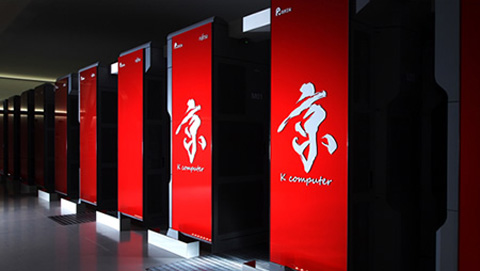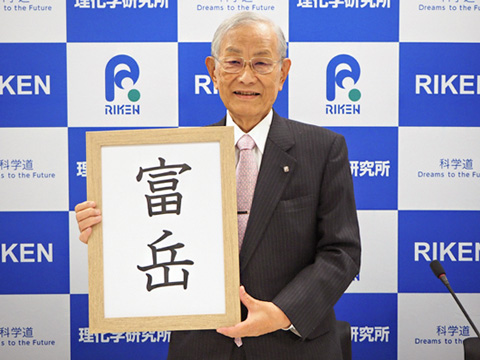News
Riken's Supercomputer “K” Shuts Down and Relays Tasks to Successor “Fugaku” Updated in October 2019
Riken's K-computer has ended its operation and was shut down on August 30. The running of the supercomputer had been jointly supported by different research institutions. As a supercomputer representing Japan, K had accomplished many cornerstones for almost seven years. Now the role of K-computer will be passed on to Fugaku, K's successor. Fugaku will start its operation around 2021.

The development of K-computer was led by the Japanese government in 2006. 111 billion yen was invested. Riken and Fujitsu co-developed it and started its operation in September 2012. K is able to calculate ten quadrillion (1016=10,000,000,000,000,000) times per second. It was widely used by universities, public research institutions and companies throughout Japan and abroad, and contributed to agendas like global environment, disaster prevention, life science, medical care and various other R&D projects taken up by private companies. On August 16, K had already completed joint-operation tasks for research institutes and companies. Since then, it has been backing up colossal amounts of data. The system itself was shut down on August 30 with a closing ceremony in Kobe, Japan.
K was named the fastest supercomputer according to world rankings in 2011 and 2012. After that, however, K slipped away in the ranking and lost its position to supercomputers from China and the U.S. Due to such circumstances, the government decided to develop a next-generation supercomputer with Fujitsu since fiscal year 2014.

The new supercomputer Fugaku will start operation around 2021. It is aiming to attain world-class speed which is said to reach 100 times the level of K. Just like K, it will be installed at Riken's Center for Computational Science (R-CCS) in Kobe. Aside from fields like global environment, climate change and disaster-prevention, where supercomputers play a large part, Fugaku is expected to contribute in artificial intelligence (AI), life science and various other fields. The new computer's name Fugaku was selected from many names sent in from the general public. Among 5,200 names, Fugaku was selected. Fugaku is another way to call Mount Fuji, Japan's highest mountain (3,776 meters). “The name Fugaku would hopefully evoke familiarity among users around the world,” commented Riken.
On July 27, Riken revealed the new supercomputer's logo which resembles the triangle-shaped Mount Fuji. The height of the mountain is supposed to represent Fugaku's high performance, while the foot of the mountain expresses widespread joint-usage among many people.








